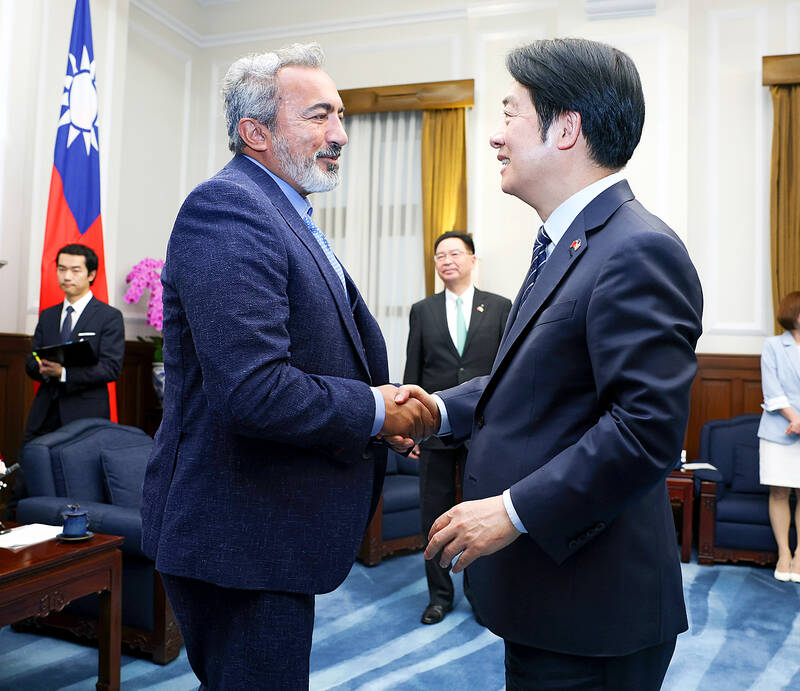President William Lai (賴清德) yesterday welcomed a delegation of US lawmakers and said he hoped that Taiwan-US military cooperation can expand to include joint research and development.
Speaking at the Presidential Office, Lai thanked US Representative Ami Bera, cochair of the Congressional Taiwan Caucus, for leading the all-Democratic delegation.
Lai said that Bera last visited in January last year, shortly after Taiwan’s presidential election, to demonstrate “support for Taiwan’s democracy.”

Photo: CNA
“This time, as head of the delegation of new members of the House armed services committee and the foreign affairs committee, he [Bera] is continuing to foster US Congressional support for Taiwan,” the president said.
He thanked the delegates for their initiatives in support of Taiwan, bolstering bilateral relations and continuing to focus on stability in the Taiwan Strait.
The government is prioritizing a special budget to increase defense spending to 3 percent of GDP this year, Lai said, reaffirming his administration’s efforts to bolster Taiwan’s self-defense capabilities and maintain peace in the Indo-Pacific region.
He also emphasized the importance of enhancing economic ties with the US, and expressed hope that the US-Taiwan expedited double-tax relief act would be passed and signed into law later this year.
The bill, which was passed by the US House of Representatives on Jan. 15, is now under consideration in the US Senate.
Taiwan has said it would eliminate tax barriers, resolve double taxation issues, and encourage greater economic and investment activity between the two sides.
During the meeting, Bera recalled his previous his trip and said he believed they were the first congressional delegation to visit then-president-elect Lai following his election victory.
It is crucial for democracies to work together to maintain peace in Asia, he said.
“When we look at conflict in Europe, conflict in the Middle East, it is important for democracies to hold the peace in Asia. That’s why it was important for us to bring a delegation of members of the Foreign Affairs Committee and the Armed Services Committee,” Bera said.
In addition to Bera, the delegation includes US representatives Gabe Amo, Wesley Bell, Julie Johnson, Sarah McBride and Johnny Olszewski — all of whom are visiting Taiwan for the first time.
Discussions during the visit, which runs through tomorow, would cover Taiwan-US relations, regional security, economic cooperation and supply chain resilience, the Ministry of Foreign Affairs said.

The Taiwanese passport ranked 33rd in a global listing of passports by convenience this month, rising three places from last month’s ranking, but matching its position in January last year. The Henley Passport Index, an international ranking of passports by the number of designations its holder can travel to without a visa, showed that the Taiwan passport enables holders to travel to 139 countries and territories without a visa. Singapore’s passport was ranked the most powerful with visa-free access to 192 destinations out of 227, according to the index published on Tuesday by UK-based migration investment consultancy firm Henley and Partners. Japan’s and

NATIONAL SECURITY THREAT: An official said that Guan Guan’s comments had gone beyond the threshold of free speech, as she advocated for the destruction of the ROC China-born media influencer Guan Guan’s (關關) residency permit has been revoked for repeatedly posting pro-China content that threatens national security, the National Immigration Agency said yesterday. Guan Guan has said many controversial things in her videos posted to Douyin (抖音), including “the red flag will soon be painted all over Taiwan” and “Taiwan is an inseparable part of China,” while expressing hope for expedited “reunification.” The agency received multiple reports alleging that Guan Guan had advocated for armed reunification last year. After investigating, the agency last month issued a notice requiring her to appear and account for her actions. Guan Guan appeared as required,

Japan and the Philippines yesterday signed a defense pact that would allow the tax-free provision of ammunition, fuel, food and other necessities when their forces stage joint training to boost deterrence against China’s growing aggression in the region and to bolster their preparation for natural disasters. Japan has faced increasing political, trade and security tensions with China, which was angered by Japanese Prime Minister Sanae Takaichi’s remark that a Chinese attack on Taiwan would be a survival-threatening situation for Japan, triggering a military response. Japan and the Philippines have also had separate territorial conflicts with Beijing in the East and South China

A strong cold air mass is expected to arrive tonight, bringing a change in weather and a drop in temperature, the Central Weather Administration (CWA) said. The coldest time would be early on Thursday morning, with temperatures in some areas dipping as low as 8°C, it said. Daytime highs yesterday were 22°C to 24°C in northern and eastern Taiwan, and about 25°C to 28°C in the central and southern regions, it said. However, nighttime lows would dip to about 15°C to 16°C in central and northern Taiwan as well as the northeast, and 17°C to 19°C elsewhere, it said. Tropical Storm Nokaen, currently